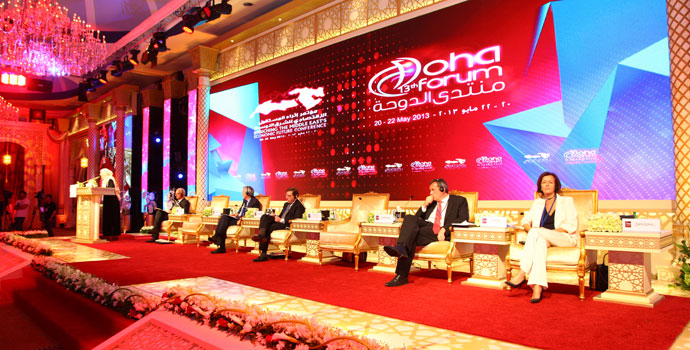


The international guests of honor this year will include some current Heads of State and Government. The Forum will also feature other distinguished opinion leaders, eminent political thinkers, decision – makers and members of parliament, renowned businessmen, academics, media figures and international organizations. These participants will contribute to a free, learned and stimulating debate on each of the many topics on the Forum's agenda, with a focus on the Arab Spring, the global financial and economic crisis, International Cooperation, Global Economy, Development, Human Rights and Digital Media.
The 13th Doha Forum will be held at the Ritz Carlton Hotel in the State of Qatar from 20-22 May, 2013. It will be attended by more than 600 participants representing over 80 countries and organizations.
Doha Forum Participants Call For Intervention In Syria, Regional Action To Boost Mideast Economy

Doha, 20th May 2013: Participants in the first discussion panel of this year’s Doha Forum, which started in the Qatari capital on Monday, warned of the consequences of allowing the bloodshed in Syria to continue. They also called for more regional action to boost the Middle East economy and global action to tackle the economic and climate problems of an increasingly interconnected world.
“We should put an end to the catastrophe of the Syrian conflict and stop it spreading beyond its borders,” said Francois Fillon, who served as France’s prime minister from 2007-12 under the presidency of Nicolas Sarkozy. “It is destabilising the region, weapons are coming from everywhere to Syria (and) Assad wants to export the conflict beyond his borders.”
Wolfgang Ischinger, chairman of the Munich Security Conference and Germany’s chief negotiator at the Dayton negotiations that tried to stop bloodshed in the Bosnian war in 1995, expressed similar fears.
“If we keep doing what we are doing collectively, we will end up with the worst of the worst: hundredsof thousands dead, a failed state, a destabilised region, loose weapons of mass destruction, extremism. Syria is failing as we speak. Hatred and conflict have already ripped apart Syria’s society,” he said. “I’m reminded of Bosnia… And this is I want to say: doing nothing because doing something is so difficult also breeds responsibility and guilt. Inactivity is not a strategy. What then? The longer it takes, the worse it gets.”
Both said they saw some hope in a conference of all parties to the Syrian conflict – which began in 2011 as Arab populations rose up against entrenched rulers across the region – that the United States and Russia say they hope to organise, perhaps within weeks.
Ischinger also echoed comments made earlier by the Emir of Qatar, His Highness Sheikh Hamad bin Khalifa Al Thani in his opening address for more progress on ending the Israeli-Palestinian conflict. He said the European Union had not done enough to push the two parties towards resolving the conflict, and needed to do more than focus its efforts on funding the Palestinian Authority.
“For all the good sense of EU statements on this issue over the years, the EU’s inactivity in the face of increasingly dangerous stagnation is both unprincipled and unwise,” Ischinger said. “Later generations will see it as unforgivable that we Europeans not only allowed the situation to develop to this point of acute tension, but took no action now to remedy the continuing destruction of the Palestinian people’s right to self-determination.”
Former UK prime minister, Gordon Brown said he was worried by a lack of global resolve to tackle issues jointly such as climate change and world trade talks, adding that the lack of cooperation at a regional and global level – partly a consequence of the financial downtown worldwide – was hurting everyone.
“World growth is 3 percent when it should be 6 percent, Western economies are not growing,” Brown said, while “we are at a unique transition point where for the first time the majority of production is in the East but the majority of consumer spending is still in the West”.
“We will see in the next two decades a global middle class which may be one billion people but will be a few billion more people by 2025.We will see urbanisation move from almost 50 percent of the population to 60 then 70 percent of the population, we will see two billion people owning cars and homes in a spread of middle class prosperity that is unprecedented in history,” Brown said. This will constitute “a major turning point in the global economy…, so we need global cooperation to secure growth”.
Turning to the Middle East, Brown said growth was also not at levels it should be but affluent Gulf countries were in a position to change that. “Egypt’s growth is 2.2 percent, Jordan’s is 2.6 percent, Morocco’s 2.4 percent, Tunisia 3.6 percent this year, but growth in all these cases could be 5-10 percent each year,” he said, proposing a Middle East and North Africa development bank along the lines of the Islamic Development Bank and funded by oil states to train youth and find them jobs. “This region has young people, a high number who want to set up businesses, but youth unemployment is high,”said Brown, a vocal opponent of austerity measures taken by the UK government since he left office in 2010.
Vice President Boudou, a former economy minister, said austerity measures were hurting developing countries and global action was needed to find another way out of the financial crisis.
“We need to engineer a new financial system so we can get out of this crisis safely. We need to put an end to austerity policies. When we reduce budgets of entire countries it will have a direct impact on people of the world,” he said, citing Qatar as a good example of a country employing available resources to improve the well-being of its people.“Austerity policies are casting shadows and negative repercussions for the poor in developing countries and effecting employment rates.”
- ● Doha Forum participants want action to end Syria bloodshed, conflict spreading
- ● Argentina’s Vice President Boudou says austerity measures hurt developing countries
- ● Former UK PM Brown proposes Mideast development bank to fight youth unemployment
- ● Brown says Western countries need to cooperate to meet economic challenges